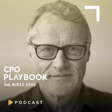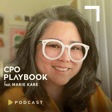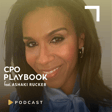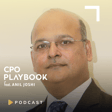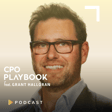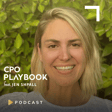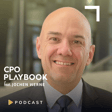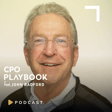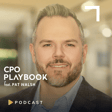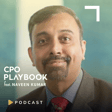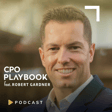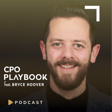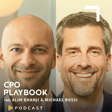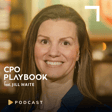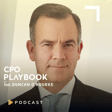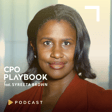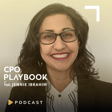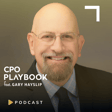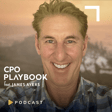Introduction to CPO Playbook Podcast
00:00:01
Speaker
I'm Felicia Shakiba, and this is CPO Playbook, where we solve a business challenge in every episode.
00:00:14
Speaker
Data from the U.S. Bureau of Labor Statistics shows that approximately 20 percent of new businesses fail during the first two years of being open, 45 percent during the first five years, and 65 percent during the first 10 years. Only 25 percent of new businesses make it to the year 15 or more.
Helping Entrepreneurs Succeed
00:00:36
Speaker
John Wensfein, the chief innovation officer at Nova Southeastern University, claims to have decoded why entrepreneurs fail and is actively establishing an entrepreneurial playground to facilitate success for entrepreneurs seeking to launch and scale, and this is not just a student-based model. According to him, by assembling the right individuals, formulating a solid plan
00:01:02
Speaker
and securing adequate funding, entrepreneurs are bound to thrive. John, welcome to the show. It's great to have you here. I'm so excited to be with you and I'm looking forward to our conversation. John, can you share the inspiration behind what you've built or have been building over the last few years for Nova and perhaps walk me through your philosophy that supports entrepreneurial success?
00:01:31
Speaker
Well, it's kind of interesting. I started my position as the Chief Innovation Office here at NSU, which incidentally is the largest private research university in the state of Florida with a $5 billion impact on the regions that we serve. And when I was brought on board, I was asked to create an innovation center in quotes. And those that were talking to me had a general idea of what one was, but I don't think fully understood the impact that it could have on a community.
00:01:58
Speaker
I turned out to be an ideal candidate because I had my own entrepreneurial journey of success and failure. When I found out what the opportunity was, I had a couple of conditions.
00:02:10
Speaker
around our discussion before joining. And I had to make sure that there was one rule that was very important that had to be supported. And the number one rule is that there are no rules. And if that's the case, and you allow me the freedom to fly, then I'm your person to build out this innovation center. And it's not gonna be local impact. It's gonna be regional, national, and international.
Innovation Center Achievements
00:02:32
Speaker
And the idea behind it was to figure out
00:02:36
Speaker
how you could reverse engineer the success of an entrepreneur from the very birth of an idea right through the successful exit of a company. And candidly, after looking at the world, not just at the United States, no one has figured out how to do that. And I don't know if anybody ever will. It's kind of like looking at an airline. Can you create the world's most perfect airline? And I come from that industry. And the answer is no, but you can always improve upon it and make things better.
00:03:03
Speaker
So I set out on a personal mission, which has now become a community mission to figure out how you create truly an economic and education development engine in South Florida that literally has global impact that can take an entrepreneur from the birth of an idea right through the successful exit of a company or global expansion and bring it all under one roof.
00:03:24
Speaker
So what we did is we created the world's first theme park for entrepreneurs, which we've trademarked because people understand the nature of a theme park. And when you're in a theme park, there are different worlds and rides.
00:03:35
Speaker
and our rides have returned on investment for all of the stakeholders that make this successful. And two years ago, next month in April, we'll officially have been opened. And the idea here is that if you could take an entrepreneur at different stages of launch and scale up and put them under their 54,000 square foot of purpose-built space that have access to all kinds of rides,
00:03:56
Speaker
and create truly a giant collision station that the first time globally forces entrepreneurs to collide with academia, industry, government, funders, professional networks, service providers, and a whole lot more. And could you in theory take
00:04:13
Speaker
yourself as an example, off the street and over the course of 12 months, ideate, incubate, accelerate and launch your business and then potentially exit or go for global expansion. And we proved the concept with one organization and we did so very successfully, which meant that we could do it with others.
00:04:32
Speaker
So the philosophy behind what we built here was to figure out how to minimize the risk for entrepreneurs at all the different phases of the life cycle of the entrepreneur, which there were four in its ID8, incubate, accelerate, and post accelerate.
00:04:46
Speaker
and bring the world to them rather than having to go and find the world and ultimately fail. And as of now, in less than two years, we've now served over 200 entrepreneurs. We've created 95 new companies. We have an $86 million impact on the region.
00:05:03
Speaker
And those numbers are only going to double and triple as we begin to accelerate.
Challenges and Talent Gaps
00:05:07
Speaker
So I'd like to say we're a scrappy startup helping startups, but we're now at that level of maturity where the data, there's a lot more that we're reporting out now officially to the federal government is meeting the metrics of an organization that's been around for eight to 10 years. So that's how fast we're growing while we're helping others. And I think we have figured out the secret sauce that we're only going to improve upon over time.
00:05:31
Speaker
Wow. What an opportunity that is for yourself to build out such an amazing program, but also just it sounds like for the community, for the students, for everyone involved. It's a tremendous mission and I'm so excited to dig into this experience with you. So if you could share what challenges have you seen entrepreneurs face in terms of talent gaps, how do you help them address those?
00:06:00
Speaker
It's a really interesting question that opens up Pandora's box because it's a global phenomenon, finding talent versus qualified skill talent. There's a huge differentiator between the two and there is an abundance of talent in the world and right here in our own region of South Florida, which consists of Miami, Fort Lauderdale and
00:06:18
Speaker
Palm Beach areas, but there is not an abundance of qualified skilled talent. So in terms of the challenges that we face when we started looking at the design and build out of an innovation center, we wanted to make sure that we had the right partners involved that truly understood what some of those challenges were.
00:06:34
Speaker
So the Innovation Centre model that we created is actually a public-private partnership between the University and Broward County, which is our local government, and we both co-invested equally into the build-out of what we've put together with the idea that we would take the lead as being that economic and education development engine for the county and for the region.
00:06:54
Speaker
And with that, we were given free reign to really understand what kind of trends exist, as well as opportunities and challenges to develop strategies that help fulfill some of the red tape around the talent question that we have right now.
00:07:10
Speaker
And the challenge that we have in South Florida is that we've always been known for sunshine beaches and cruise ships and spring break and the idea of rebranding our region. So that's not just that, but it's also a startup community, a scale up community that we're an incentive for people to come to the South Florida region for innovation technology and entrepreneurship. And it's very easy to recruit talent to the South Florida region, but it is very challenging to retain
00:07:40
Speaker
that talent because number one, it's not cheap to live in South Florida. Contrary to popular belief, it's actually very expensive. There are transportation challenges, particularly public transportation, congestion on the roads. Affordable housing is a critical situation, even homelessness to a certain degree, and paradise isn't often paradise once you're living in it.
00:08:05
Speaker
an innovation ecosystem that is really at the foothills of maturity.
Rebranding South Florida as an Innovation Hub
00:08:11
Speaker
It's just starting to grow and attracting a lot of attention from across the country, from your Silicon Valley's to your Boston's, your New York's, your Austin's as an example.
00:08:20
Speaker
It's exciting to learn about, but once you get here or to home grow the talent, there are a lot of challenges that go around that. And that's one of the big issues that entrepreneurs and companies that are mature are facing is because they're finding it very difficult to find the right talent for the right job, the right skills.
00:08:40
Speaker
Even though I represent an academic institution, I'm usually one of the first to say publicly that academic institutions and industry, there's a huge divide between those worlds and that academic institutions have typically dictated to industry what their needs are rather than listening to industry. And industry often will say, hey, we're really concerned that we're not getting the skills out of the academic or training institutions in the public and private sector.
00:09:05
Speaker
and you need to do something about it. And then this innovation center and myself as an ambassador go and say, well, listen, we got to get around the same table and we understand the challenges on both sides. It's time to sunset old programs that are no longer relevant. It's time to focus on more skills-based opportunities. The word apprenticeship should be sexy again, and it's not just blue collar trade anymore.
00:09:31
Speaker
And especially in technology and industry, if you really have these challenges, you need to strategically co-invest with the academic institutions and the training providers so that we are delivering and you are hiring and hopefully growing those individuals within your own organizations or industries.
00:09:48
Speaker
that you represent. So those are the main challenges in terms of what the environment looks like and then as an entrepreneur I don't necessarily have resources at the early stage of development to be able to pay the compensation that's expected of individuals and the world has changed in the last four years and one of the dilemmas that I'm often faced with talking to entrepreneurs and other existing large businesses and government is that
00:10:14
Speaker
The question is, should I change my model to accommodate the new workforce? Or should the new workforce change to accommodate what we used to do in an environment or is it a bit of a hybrid model where there's give and take and there's pros and cons to all of that. But these are active discussions that we're having every single day. But there are so many other challenges behind that. But talent versus qualified skill talent is probably the most important. And where do you get them? Where do you source them? How do you home grow? How do you recruit? And then how do you retain?
00:10:43
Speaker
Okay, so let's dig into that. What strategies have you found so far most effective for helping entrepreneurs identify and recruit and retain the right people for their teams?
00:10:57
Speaker
It's interesting when you look at entrepreneurs because it's a really great definition of what an entrepreneur is. But an entrepreneur is essentially an enterprise builder. They've identified a challenge, they've got a solution, and they're commercializing it and hopefully scaling it. And when you're dealing with the early stage entrepreneurs, those that don't have a lot of experience, which is where we spend most of our focus, they don't know what they don't know. And an entrepreneur is very excited about what they're going to build, their company idea, but they don't necessarily have all of the knowledge and skills to be able to take it to the next level.
00:11:26
Speaker
And one of the hard lessons that an entrepreneur often learns early on by mistake is that they're not necessarily going to be the CEO of their company as it begins to grow because they're going to need new types of talent and skills and experience to be able to take that company to the next level. And when you look at early stage startup companies and the majority of them do fail, it's because they don't have the right plan, the right people, or the right money, or a combination
00:11:53
Speaker
of those factors. And if one of those is wrong, then unfortunately it could be the detriment of your whole vision, your dream.
Guidance for Entrepreneurial Growth
00:12:01
Speaker
And what we've done within our space by bringing in experienced entrepreneurs that have been there and done it, they've had successful exit, they're qualified mentors and coaches, investors. We bring in a lot of that guidance and advice so that you
00:12:17
Speaker
minimize your risk from the very beginning. And our philosophy is that if you're coming into the Levan Center of Innovation, before you do anything, we're going to figure out
00:12:26
Speaker
how to change your mindset so that you're going to create an idea and you're going to scale your company at an accelerated pace. You're going to fund it at an accelerated pace, and you're going to accelerate your exit at an accelerated pace. And if you follow these rules and listen to your coaches and mentors and the content of the programs that you're engaged with and the networks that we're connecting you to, then you're going to avoid a lot of mistakes that others have done before you, including myself.
00:12:56
Speaker
Sometimes that's really hard for entrepreneurs to absorb because they think they know a lot about a lot. And the reality is the smarter you get, the less you know about the world. And our job is to show you that there's a lot more that you need to know and just follow the map and we'll help guide you there. So that's our culture. That's our climate. And most of the people that engage with us sometimes have a hard time
00:13:20
Speaker
absorbing that they need to change their thought process but when they do and recognize that we can get you from A to Z and yes you're going to do the hard work and yes you're going to struggle and yes you're going to have failures along the way that you're going to learn from but we're going to help avoid those risks wherever we possibly can so that you can be wildly successful at the end of the day.
00:13:40
Speaker
So having an entrepreneurial spirit is important or an entrepreneurial mindset is important. And being able to take advantage of your program and your resources, the network, you're saying all come together to help entrepreneurs be successful, whether it be talent or product or anything else. Is that fair to say?
00:14:01
Speaker
Yeah, absolutely. You're 100% correct. You said something earlier where it was about listening to the workforce and the needs of the workforce and then kind of working backwards and creating skill sets within academia to help support what the workforce needs. How do you do that?
00:14:18
Speaker
This is an interesting question. So again, I'm representing an academic institution, but I'm not thinking as an academic. And that's where my success has been. I've been a successful business entrepreneur, industry type person, but also successful in academic environments that are truly full of bureaucracy and red tape and silos. And the idea behind the innovation center,
00:14:44
Speaker
being built is another one of those rules, is that it can't be owned by anybody, it can't report anybody. It has to be built to Switzerland within a very large university framework that then becomes the catalyst or the portal to open up new opportunities that over time will break down silos. So in our case at the university, we have 15 academic units and numerous non-academic units, and we have a philosophy called one NSU, and the goal is we all work together.
00:15:13
Speaker
The reality of it is not everybody does work together. And we do have silos between units that are academic and non-academic in nature. And I've spent the last four years creating education and awareness programs to the university community and outside of the university, the community at large, the public and private sector, which is frankly where we spend most of our energy actually outside the walls of the university, because that's the fastest chance of success helping entrepreneurs that are not affiliated with the university.
00:15:43
Speaker
and showing them that an innovation center can lead to success. So in the case of a university, it leads to commercialization of research, more intellectual property rights, technology transfer patents as examples. And if you change the mindset of a researcher or an academic or embed new ways of thinking around innovation entrepreneurship technology into academic curriculum,
00:16:08
Speaker
the results begin to change over time where you're actually creating businesses and hopefully scaling those businesses. So we're in that transition as a university right now where this portal, this gateway, this Switzerland that we've created is truly breaking down the barriers. It takes a long time, but we're making significant progress. And then with the successes that we have outside the walls of the university, which is about 90% of our success coming from outside the university,
00:16:35
Speaker
internally, when people begin to see what those successes are, everybody wants to be part of that club.
Building an Innovation Ecosystem
00:16:41
Speaker
And then what we do as an innovation center is we glue the internal and external worlds together. So now we have more partnerships, more grants, more businesses being created, more angel and venture capital investment dollars starting to form. And slowly but surely, we're truly building not a tech hub, but an innovation ecosystem here in South Florida.
00:17:01
Speaker
So I want to dig in to that piece about what you do. What does this program entail? How do you help entrepreneurs actually create a product or an organization and then get people to be involved in their vision, whether it be employees or contractors, like how do you help entrepreneurs bring people together to elevate the opportunity for success for their startup?
00:17:29
Speaker
The first thing we do is we start with an incredible team. So I have a small and mighty team of full-time personnel that represent different units from programs to memberships to services. And then we have an extremely large volunteer base and a fairly decent sized vendor base. And I don't like to use the word vendor. I believe in strategic partnerships. So first you date, then you propose and you get married and hopefully you don't ever get divorced. And that's the nature of the
00:17:57
Speaker
ecosystem that we continue to build here. Once you've got the team in place and the physical infrastructure, we then go out to the world and identify entrepreneurs. Some will say that you have to be born with entrepreneurship in your DNA. I don't agree with that. You can teach somebody to be an entrepreneur if they have the mindset to be able to adapt and the skill set to be able to learn.
00:18:18
Speaker
And then what we do is we bring you in at one of three levels. So it might be just the ID8 stage. So if you qualify, you'll go in free of charge, by the way, into an ID8 program where we're just teaching you over the course of about six weeks how to create an idea and form it into something that can be looked at. The next level is the incubate. Now that I've got the idea, I'm incubating the idea. I'm fine tuning it. And again, over a six, eight week period,
00:18:46
Speaker
you're going to leave a program that's also free of charge with a much better idea of what your business model is going to look like. The third phase is the Accelerate. And Accelerate can be a business that's already got some revenue, maybe has an employee or two
00:19:04
Speaker
and they're starting to grow or they're not even in business yet. They're not in the commercial sector, but they're creating their business plan. That's going to allow them to enter the market and to do so successfully. And that's about a 10 week program. And what we do is we don't focus on any particular industry vertical. We open the door to any type of entrepreneur that has an idea and it doesn't have to be just technology focused because a lot of great non-technology ideas out there.
Entrepreneurial Adaptability and Challenges
00:19:31
Speaker
as one track, then we've created another track that's exclusively focused on space. So we created the term space pernership and we're the first space pernership program in South Florida where I can now take somebody through that ID8 and incubate and accelerate, but it's customized to the space economy
00:19:47
Speaker
and show people how they can pivot their ideas and businesses to actually be space companies, which in many cases is out of this world for people. And then we have a third track, which is brand new for us, and it's focused on veterans and entrepreneurship. So how do you take military veterans that discovered challenges that need solutions during their time of service? And now we put them through a multi-week program. We actually have two versions of it. We're in the middle of it as we speak.
00:20:17
Speaker
and show them how to take that idea that they discovered in the field of service to now become a commercialized business. So three different pathways, and once you come in, we don't just accept anybody. We do have a place for everybody, but when it comes to programming, there is an application process, there is a screening committee, there is an interview, and we need to make sure that you've got the ability to have the mindset to be successful and that you're willing to learn.
00:20:43
Speaker
And we will learn from you as well, because you've got the idea. You think you have a solution to the challenge, and then we'll help massage that. And we always tell people up front, it's kind of like creating a business plan. If you don't have a plan, you plan to fail. But understand it's only a plan. And what you actually launch and scale is probably not going to be what the original thought was. And you have to adapt to that and understand it. And we've had some that have said, nope, this is my idea, take it or leave it.
00:21:10
Speaker
they're not a fit. Unfortunately, we'll help you in different ways, but you have to be able to understand that what comes out at the end of the machine versus what went in is not going to be the same thing in almost every single case. And that's part of that mindset that you have to learn. So we teach you the entrepreneurial mindset, the strategic mindset. We teach you that
00:21:30
Speaker
This is the hardest thing you're ever going to do. An entrepreneur is not working the hours that you want to work and taking vacations whenever you want to work. It is the hardest thing in the world. It's a lonely pathway because there's not a lot of you out there. So what we do is we create the tribe. And if you're successful within that tribe, you found your supporters and you're going to learn off of each other. And hopefully you'll end up even going into business with each other, which is another thing that happens. Ideas begin to mix. And next thing you know, you're merging your ideas to become a single company.
00:22:00
Speaker
So there's a lot of things that go around that, but we have very defined programs. We have less defined programs that are a little bit more generic in nature.
00:22:07
Speaker
One of the things that we did in terms of reverse engineering success is I wanted to create what I'll call a shopping mall that has storefronts. And that's what we've essentially done, where we now bring in those wraparound service providers that you would normally have to go and find on your own, and we bring them to you. So it's everything from business planning, strategic planning, marketing, branding, legal, finance, accounting, HR,
00:22:31
Speaker
technology and we added self-care management in there because entrepreneurs need to disconnect. They're not nine-to-fibers. They're 24-7, 365, and you've got to think about yourself.
Funding and Investment Opportunities
00:22:41
Speaker
I'm the worst person about looking after myself, but it's so important to be able to make that disconnection. In theory, you can come here, never leave the building,
00:22:51
Speaker
Ideate, launch your business and exit your business as we've proven that you can do this. And now our goal is to continually improve upon that process so that we're always making more access opportunities for underserved entrepreneurs at every stage of development.
00:23:06
Speaker
bringing more and more services and networks to them and then also trying to align them with funding where we pre-screening the angel investors and the venture capitalists that are interested in pre-seed startups versus those that are looking for revenue generating or a certain level of growth or within a certain industry vertical is an example because that's one of the hardest things to find is the right money and what we do is continuously build that base up.
00:23:29
Speaker
We're not quite positioned yet, but we're in the process of being able to take equity in companies as well, which also puts more skin in the game for us to make sure that you're successful without taking away all of your real estate upfront. It's a very small percentage upfront.
00:23:43
Speaker
And then there's royalty license agreements that we can look at in the future. And then my big dream is to actually create our own investor fund so that when the right opportunities are in front of us, we can actually put our own money into these companies at the scale. So that's one of our next levels of growth as well.
00:23:59
Speaker
I think that's really interesting that you screen the money, where the money is coming from, because I know I've had my fair share of meeting with venture capitalists when I had my own startup long ago.
00:24:14
Speaker
They're always pushing the needle for a little bit further and further away. And an entrepreneur can very easily, and I'm guilty of this too, get caught up in going to the next step and then hoping for that money to come in only to find out that that money is not going to come for another next step or another next step. And so giving those resources, basically what you shared
00:24:36
Speaker
those resources that shopping mall of talent or supporters that would be able to help those entrepreneurs get to where they need to get too much faster.
Supporting Veterans in Entrepreneurship
00:24:45
Speaker
That's incredible. I'm not sure if I know anywhere else that does that, but it's very interesting to see that hub is being created. I think another thing that you said was the veteran program.
00:25:00
Speaker
I know a lot of times I've spoken to veterans where they come out and they say, I'm not sure what I want to do. I'm not sure my skill set is. But this is something that they don't have to know how to do. They have to know how to learn. They go into this program, they come out with opportunity and they know everything about their own industry because it's just where they just came out of. That is extremely unique. How is that going? I'm curious.
00:25:26
Speaker
It's turning out to be very successful. So I've always had a very strong interest in military. And over the last few years, I've spent considerable time with different military organizations. And it was a trip that I took to San Diego about a year and a half ago, where I recognized how bad the homeless situation was in San Diego. And after taking a deep dive, realized that the majority of the people on the streets in San Diego actually came out of the military in terms of males.
00:25:52
Speaker
And after doing more research on that, I was incredibly disturbed as to why. And the downtown core of San Diego, quite frankly, is a mess. It's full of homelessness. It's the odors in the air, the filth on the streets, and the greater San Diego area is beautiful, but what's going on? So there was a larger committee that was involved in all of this. It was an economic development trade mission that we took there.
00:26:16
Speaker
I personally was disturbed by the volume of people on the streets. And when I realized that many of these were people that committed their life for the service of the, of our country, um, on their last day of service, they were literally just let go. And those that are at lower ranks, that's when trouble starts to begin because they don't know what to do. They've been fed, they've been driven, they've been transported to wherever they are in the world. They haven't been on their own.
00:26:44
Speaker
And the military doesn't necessarily do the best job of trying to create a pathway for your success upon the end of your service. So I always took the belief that you are always serving your country, even when you're not in the field per se.
00:26:58
Speaker
And the, one of the next levels of programs that we're going to develop, and I'm trying to figure out how we fund this is to not just serve veterans, but find military that are in their last six months of transition from military to civilian life. Cause that's when things go really bad. That's when the drugs, the alcohol.
00:27:18
Speaker
The abuse starts to happen because they don't know what they're going to do and they're lost. So what if we could get them in the final six months of service and the military will pay for them to transition in their final six months of service to create new skills, upskilling and reskilling. So my goal now is to advance the entrepreneurship program around vets.
00:27:39
Speaker
to serving military in their final six months of service so that they transition into something and they're successful for the rest of their lives. And I will say I'm really excited next week, actually. It's the very first Veterans Entrepreneurship Pitch Night that we are doing. So they've now graduated from their first program. Some of them will go into the next stage of our program.
00:28:01
Speaker
But what I liked about them on the first day that they joined us, I went in to do a meet and greet. And it was the first time that I sat with entrepreneurs in the making, existing entrepreneurs that were all building something because of their experience in the service. And every single one of them knew exactly what it is that they were going to build.
00:28:19
Speaker
totally focused versus others that, I don't know what I want to do. I want to build a cooler like a Yeti, but I want to make it better, but I don't know what. Versus when I was in the field, I discovered this and people lost their lives. I can save lives by doing this and something relatively simple. I love that. We had about 15, 16 vets in the program. Every single one of them made it through the program. Nobody dropped out, 100 percent success, and seven of them are going to be pitching next week.
00:28:47
Speaker
And I haven't seen them practice and I'm going to walk in and just watch for the very first time. But all of the feedback that we got from our team, from those that participated, the grant funder, which is an organization called Veterans Florida that believed in what we were doing, it's going to be a win-win-win for everybody involved.
Innovation Center's Impact and Call to Action
00:29:04
Speaker
And it's only going to allow us to focus more on serving military, whether you're in service or veterans in the future.
00:29:11
Speaker
John, this is such a wonderful feat. I am incredibly impressed with so much that you and your team have done thus far. I'm so excited. I'm a huge supporter of what you're doing, and I can't wait to see what happens next year and what happens to these vets. Thank you so much for your time today. I feel honored to have had you on the show. Really, I do.
00:29:38
Speaker
a magic word, see. So you have an open invitation to come and visit us at any time and come to the world's first theme park for entrepreneurs. It's one thing to talk about it and show videos and pictures, but when you walk it, talk it and smell it, you're like, oh my gosh.
00:29:53
Speaker
This has never been done before. And hopefully we can scale this concept on a more global basis when others begin to figure out the success behind it. Well, maybe you can give me a picture and I'll put it on this episode's page on CPOplaybook.com. Okay. I will absolutely do that. And I appreciate the opportunity to speak with you today too. Awesome. Thanks so much, John. Thank you.
00:30:17
Speaker
That's John Wensven, Chief Innovation Officer at Nova Southeastern University, Florida. If today's episode captured your interest, please consider sharing it with a friend or visit cpoplaybook.com to read the episode or learn more about leadership and talent management. We greatly appreciate your rating, review and support as a subscriber. I'm Felicia Shakiba. See you next Wednesday and thanks for listening.

